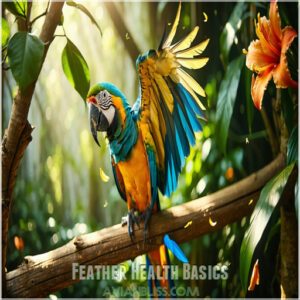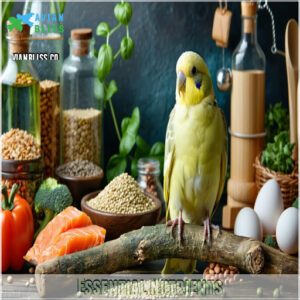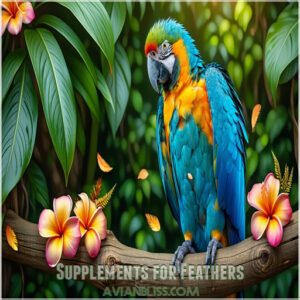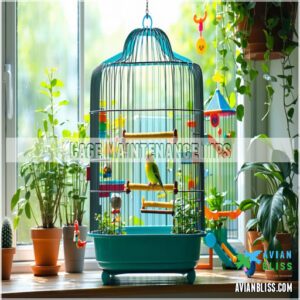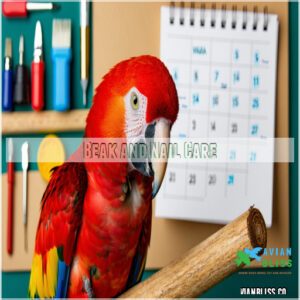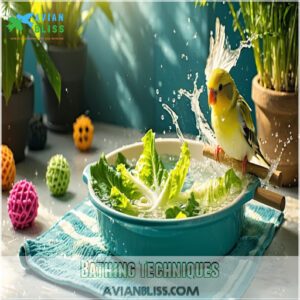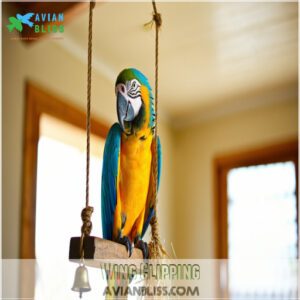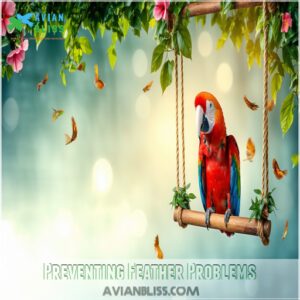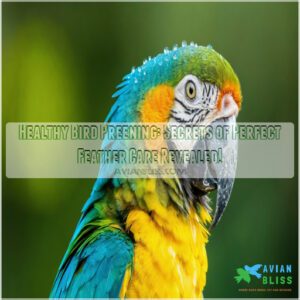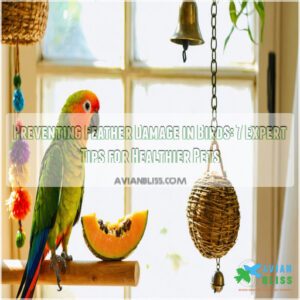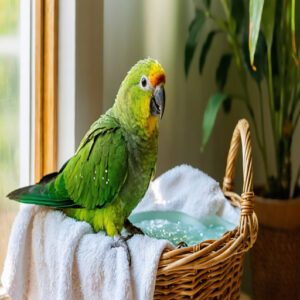This site is supported by our readers. We may earn a commission, at no cost to you, if you purchase through links.

Make sure fresh water is always available for hydration, and clean the cage regularly, and don’t forget toys, perches, and sunlight for a happy, stress-free bird.
Bathing is key—offer a shallow dish or misting for safe feather cleaning.
Watch for signs like frayed edges or plucking, which may signal stress or illness, and remember that a little care goes a long way to keep your feathered friend looking fabulous!
Table Of Contents
- Key Takeaways
- Feather Health Basics
- Nutrition for Feather Care
- Cage Maintenance Tips
- Bird Grooming Essentials
- Preventing Feather Problems
- Frequently Asked Questions (FAQs)
- How do you care for a feathered pet?
- How do you care for a feathered bird?
- How do I choose a feathered friend?
- How to keep a parrot’s feathers healthy?
- How do I Keep my Bird healthy?
- Where can I buy a feathered bird?
- How to keep bird feathers healthy?
- How can I improve my bird feather quality?
- How to clean pet bird feathers?
- How do you preserve pet bird feathers?
- Conclusion
Key Takeaways
- Offer a balanced diet rich in proteins, vitamins (A, E, biotin), and fatty acids like flaxseed or fish oil to keep your bird’s feathers strong and vibrant.
- Provide regular misting or shallow baths to help your bird clean and maintain their feathers naturally.
- Keep the cage clean, supply fresh water daily, and create a safe environment with toys, perches, and sunlight to reduce stress.
- Watch for signs of feather problems like fraying or plucking, address issues early, and schedule regular health check-ups with an avian vet.
Feather Health Basics
Feathers aren’t just for looks—they protect your bird, regulate body temperature, and enable flight.
Understanding the types of feathers and spotting problems early helps you keep them healthy and strong.
Importance of Feathers
Bird feathers aren’t just for looks – they’re powerhouses of function.
They provide bird insulation, protection, and flight mechanics.
Healthy bird feathers guarantee smooth movement and stability, while feather flexibility prevents breakage.
Strong plumage condition also signals good feather health, and consistent feather care, including regular bird feather maintenance, keeps your bird happy, secure, and soaring stress-free.
Types of Feathers
Feathers aren’t just for show—they each have a purpose.
Understanding feather types helps you support feather health.
Here’s the breakdown:
- Primary Feathers: Essential for flight, these sturdy feathers handle lift and direction.
- Secondary Feathers: Help with balance and smoother gliding.
- Tail Feathers: Act like a bird’s rudder for steering.
- Soft Feathers: Provide warmth and insulation.
Understanding the different types of bird feathers is essential for maintaining overall feather health and appearance.
Feather Problems
After learning about feather types, recognizing feather problems is key to your bird’s well-being.
Damaged feathers, frayed edges, or color fading can signal molting issues, stress, or poor feather care.
Feather plucking or breakage points to deeper health concerns or a need for feather plucking solutions.
Understanding feather loss causes is essential for providing proper care and addressing potential issues early on.
| Problem | Possible Cause | Action Needed |
|---|---|---|
| Frayed Edges | Poor nutrition | Improve diet, add protein |
| Color Fading | Stress or illness | Consult a vet |
| Damaged Feathers | Overpreening or mites | Treat pests, reduce stress |
Nutrition for Feather Care
Your bird’s feathers rely on proper nutrition to stay strong, vibrant, and healthy.
By providing a balanced diet rich in essential nutrients like proteins, vitamins, and minerals, you’ll set the foundation for beautiful feathers that are resilient.
Essential Nutrients
Strong, shiny feathers don’t happen by chance—they’re built from the inside out with the right mix of nutrients.
Focus on these building blocks:
- Protein sources: Lean meats, eggs, and legumes grow healthy feathers.
- Fatty acids: Flaxseed or fish oil reduce inflammation.
- Vitamin intake: A, E, and biotin aid strength.
- Mineral balance: Calcium supports elasticity.
- Hydration: Always offer fresh water.
A well-balanced diet that includes bird feather vitamins is essential for maintaining healthy feathers and overall bird health.
Balanced Diet
A proper bird diet isn’t just seeds and pellets.
Balanced nutrition powers their feathers, energy, and mood.
Focus on nutrient balance, food variety, and thoughtful meal planning.
Offer grains, proteins, and greens.
Here’s a quick guide:
| Category | Examples |
|---|---|
| Proteins | Cooked eggs, legumes |
| Grains | Oats, quinoa |
| Veggies | Carrots, spinach |
Understanding bird food for feather growth is essential for a healthy plumage.
Balanced meals make healthy bird feathers shine.
Fresh Food Options
Want to brighten up your bird’s daily menu?
Add a splash of color with organic produce , mix in nutrient-rich leafy greens, colorful bell peppers, and fresh fruits like berries and mango.
These healthy treats should make up 20-40% of your feathered friend’s daily intake.
Providing high quality Organic Bird Food is essential for their overall health.
Remember to remove fresh foods after a few hours to keep your bird safe and healthy.
Supplements for Feathers
Your bird’s feathers can shine like silk with the right vitamin supplements and mineral support.
Top feather boosters like FeatheredUp! combine essential omega-3 fatty acids with vitamins A and E for vibrant plumage.
Add Feather Fast during molting for extra protein and amino acids, and pair it with Calcivet for the best results.
Don’t forget probiotics—they help your bird absorb these nutrients better, which can lead to a significant improvement with the right vitamin supplements.
Cage Maintenance Tips
You’ll be amazed at how your bird’s feathers improve when you maintain a clean, enriching cage environment with fresh water and proper sunlight exposure.
Just like you wouldn’t want to live in a messy house, your feathered friend needs a tidy home with the right mix of toys, perches, and safe spaces to stay healthy and happy.
Cleaning The Cage
A clean cage keeps your feathered friend thriving.
Your daily cleaning routine should focus on removing uneaten food, droppings, and waste materials while replacing cage liners.
Effective cage cleaning products are essential for maintaining a healthy environment.
Deep clean the entire cage weekly using bird-safe products like vinegar and unscented dish soap.
For ideal cage hygiene and odor control, take the cage outside monthly for a thorough sanitizing session with non-toxic cage cleaning products.
Providing Fresh Water
Just like a desert oasis keeps wildlife thriving, fresh water keeps your feathered friend’s health and hydration in top shape.
Your pet bird’s drinking habits directly impact their feather care and overall wellbeing.
Here’s what you need to know about water quality:
- Replace water twice daily, even if it looks clean
- Use filtered water to remove impurities
- Monitor water consumption patterns
- Clean water dishes with hot water before refilling
Environmental Enrichment
Every successful environmental enrichment strategy starts with smart space optimization in your bird’s home.
You’ll need various safe bird toys at different heights, incorporating swings and ladders for natural movement.
Mix up the environment with rotating toys and activities weekly, and add foraging puzzles like treat-filled PVC tubes.
Remember to position perches at different angles to encourage exploration and maintain proper environmental control.
Safe Sunbathing Practices
While your bird explores their enrichment toys, sunlight can be their next adventure.
Smart UV safety means giving your feathered friend morning sun sessions that support vitamin D production and feather health .
You’ll notice them striking fascinating poses to soak up those rays.
Here’s your sun protection checklist:
- Limit exposure to 20-30 minutes
- Provide shade options
- Schedule sessions before 10 AM
- Watch for overheating signs
- Protect light-colored birds first
Bird Grooming Essentials
You’ll need more than just birdseed to keep your feathered friend looking sleek and healthy, as proper grooming includes essential tasks like feather maintenance, beak and nail care, and regular bathing.
A well-groomed bird isn’t just beautiful to look at – it’s also more comfortable, confident, and less likely to develop health problems that could ruffle its feathers.
Feather Maintenance
Throughout the molting process, maintaining healthy bird feathers requires a blend of patience and proper technique.
Watch your pet’s preening habits and support their natural feather care routine with gentle detangling.
You’ll need to monitor feather texture changes and remove loose feather dust daily.
For ideal feather maintenance, use a soft-bristled brush and provide regular misting sessions to keep those feathers gleaming.
Regular use of a Feather Brush tool is essential for removing tangles and loose feathers.
Beak and Nail Care
Maintaining your bird’s beak and nails is part of good grooming habits .
Regular nail filing keeps your bird comfortable, while proper beak shaping prevents eating difficulties.
For choosing the right tools, consult this essential bird grooming supplies guide.
Use varied-texture perches and cement surfaces for natural claw care.
Watch for overgrown nails that need trimming – you can use human nail clippers for small birds.
Schedule check-ups every 6-12 months for professional beak health assessment.
Bathing Techniques
Since proper bathing keeps your pet bird’s feathers healthy and shiny, it’s essential to master gentle cleaning techniques.
Here’s what works best for bathing pet birds:
- Mist with room-temperature water using a clean spray bottle 2-3 times weekly
- Offer a shallow dish for natural splashing and skin care
- Place fresh lettuce leaves in the cage for self-directed bathing fun
After each bath session, let your bird air-dry naturally or try gentle towel drying, which is an important part of gentle cleaning techniques.
Perch Selection
Smart perch selection shapes your bird’s foot health and comfort.
Your bird needs a variety of perch materials and sizes to stay healthy – natural wood branches help trim beaks and nails naturally.
Choose diameter sizes that let your bird’s toes grip without overlapping, and mix textures for proper foot care.
Consult an avian vet about the best perch sizes for your specific bird’s needs.
Wing Clipping
Beyond perch comfort, understanding wing clipping can impact your bird’s safety and well-being.
While trimming offers Flight Control benefits like reducing accidents with windows or fans, it’s not without drawbacks.
Your bird might lose exercise opportunities and develop stress behaviors.
For ideal Wing Safety, consider both sides – safe indoor navigation versus natural movement needs.
If you choose to clip, work with a vet for proper Trimming Techniques.
Preventing Feather Problems
You can protect your bird’s feathers by taking simple steps to prevent common problems like parasites, infections, or stress.
Regular care, a clean environment, and a routine keep their feathers healthy and vibrant.
Parasite Control
Feather care starts with keeping parasites like mites, lice, fleas, and ticks at bay.
Parasite detection is your first line of defense—watch for itching, feather loss, or irritation.
Regular cage cleaning, fresh water, and a tidy habitat make life harder for these tiny invaders.
Mite removal sprays or powders work wonders for your bird’s comfort.
Infection Prevention
Keeping infections at bay starts with sharp bird hygiene.
Regular sanitizing methods, like cleaning perches and bowls, prevent bacteria buildup and fungal growth.
Watch for infection signs—feathers dulling or feather damaging behaviors—and act fast.
Health monitoring can’t be skipped!
If needed, use vet-prescribed medication.
A clean, happy bird means healthier feathers and fewer surprise vet visits, which is the result of good health monitoring.
Regular Health Checks
Scheduling regular checkups with an avian vet is key to bird health.
Spot issues early with routine feather inspection, beak checks, and stress signs monitoring.
Make vet visits easier by staying proactive:
- Review feather health for dullness or loss.
- Check beak condition for abnormalities.
- Monitor behavior for signs of illness.
Understanding preventing feather damage is vital for maintaining healthy feathers.
Regular vet care guarantees healthy, vibrant feathers.
Reducing Stress and Anxiety
Spotting stress signals like excessive preening or loud vocalizations helps you tackle anxiety triggers in your bird’s world.
Create a peaceful environment by using calming techniques like soothing sounds or dim lighting.
Offer gentle, consistent handling and space when needed, and consider relaxation methods, such as misting during molting, which encourage natural preening behavior, promoting feather care and overall bird stress reduction.
Creating a Routine
How do daily schedules make life easier for you and your bird?
A solid routine helps with feather health and reduces anxiety.
Start simple:
- Morning routines: Feed, water, and light grooming checks.
- Consistent grooming sessions: Weekly baths and nail trims.
- Bird calendars: Track cage cleaning, feather care, and vet visits.
Routine keeps life smooth and feathers shiny!
Frequently Asked Questions (FAQs)
How do you care for a feathered pet?
Keep your bird’s feathers healthy by offering a balanced diet, regular baths, and gentle handling.
Clean the cage often, provide safe perches, and watch for issues like parasites or damaged feathers to address early.
How do you care for a feathered bird?
Caring for a feathered bird means giving them a clean, spacious home, a balanced diet, and regular baths.
Watch for damaged feathers, trim safely, and keep their environment stress-free for vibrant, healthy plumage.
How do I choose a feathered friend?
Finding the perfect feathered friend is like choosing a roommate—you’ve got to match personalities, energy, and space needs.
Research breeds, consider their lifespan, and make certain you’re ready for the commitment and care they deserve.
How to keep a parrot’s feathers healthy?
Your parrot’s feathers stay vibrant with a balanced diet, regular baths, and a clean cage.
Offer sunlight for vitamin D, minimize stress, and check for parasites.
Healthy feathers reflect a happy, thriving bird.
How do I Keep my Bird healthy?
A healthy bird thrives with fresh water, a balanced diet, regular grooming, and a clean cage.
Provide sunlight, interactive toys, and vet check-ups.
Watch for signs of stress or illness to catch problems early.
Where can I buy a feathered bird?
You can buy a feathered bird from reputable breeders, local pet stores, or adoption centers.
Always research the seller, verify the bird’s health, and confirm ethical practices for a stress-free and happy new feathered friend!
How to keep bird feathers healthy?
Keep feathers healthy by giving your bird a balanced diet with fresh veggies, regular baths for cleanliness, and a stress-free environment.
Inspect feathers often, trim damaged ones carefully, and consult a vet for concerns.
How can I improve my bird feather quality?
Feathers are like a mirror to your bird’s health.
Feed a diet rich in protein, leafy greens, and omega-3s.
Mist regularly, make certain of sunlight exposure, and keep stress low with toys and a clean cage.
How to clean pet bird feathers?
Gently mist feathers with lukewarm water or let your bird enjoy a shallow bath.
Avoid soaps—water does the trick.
Offer perches for preening after, so they can tidy up themselves like true feathered perfectionists.
How do you preserve pet bird feathers?
Start by providing a balanced diet rich in nutrients to strengthen feathers from the inside.
Regular misting and baths keep them clean and supple.
Reduce stress, inspect for damage, and promptly address any health concerns.
Conclusion
Caring for your bird’s feathers is like polishing a gemstone—it takes consistent effort, but the rewards shine brightly.
By feeding a healthy diet, ensuring fresh water, and providing enriching cage conditions, you’ll support strong, shiny feathers.
Bathing, safe perches, and regular health checks play critical roles in feather care.
Keep an eye out for stress or health issues to catch problems early, with these best feather care tips, your pet bird will stay vibrant and happy every day, following a routine that is like consistent effort.

